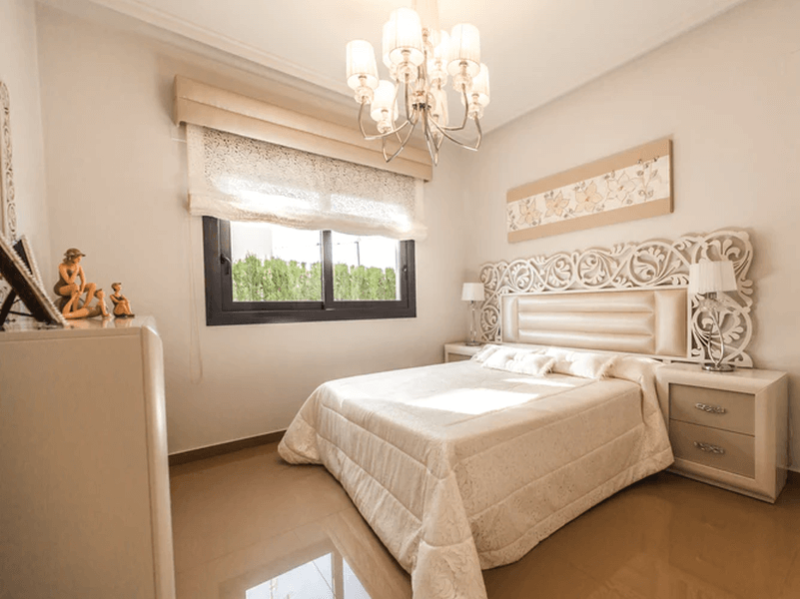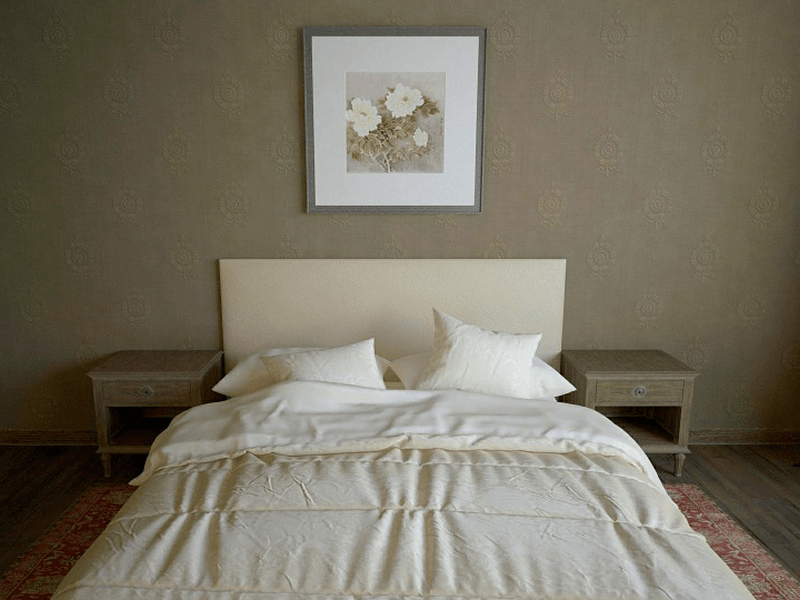What is feng shui? Simply put, it’s an ancient Chinese practice that involves placing and arranging furniture in a space to maintain proper balance of energy, otherwise known as chi. This collection of design rules is actually more about spiritual practicality—as contradictory as that may sound—than it is about style or aesthetics. You may be asking: Why is it so important to encourage good chi flow around the house, especially in your bedroom?

It has to do with the fact that your home is your dwelling, sanctuary—and ultimately, a representation of yourself. On top of being an extension of your being and a symbol of how you relate to aspects of your life, your home is likely the place where you spend most of your time, awake or not. The good kind of chi attracts and promotes similarly positive qualities in your emotional, financial, mental, physical, social and sleep health. Also: When you’re deep in slumber, prone, and in a passive state, you’re more likely to absorb chi. This is another reason why the quality of chi in your home and where you sleep is so important.
Don’t worry, though. We got you! No need to fret and wonder where to get feng shui advice. Below are some feng shui tips for sleep-deprived bedroom design beginners. We’ll look at three basic components: the bedroom itself, the bed, and other bedroom decorations or furniture. Several tips for each section are included. Good luck, and hope this helps you achieve a good night’s rest!
Choosing a Bedroom
Feng shui experts go an extra mile and actually place certain rooms of the house—and even certain key pieces of furniture—based on auspicious or “lucky” directions. How a house is structured sometimes also plays a part in the way the flow of chi is helped along. This section really is only for people currently looking for a new home or people willing to do some major rearranging. Regarding the latter: We recommend doing this only if there is another reason—new furniture bought, another housemate moving in, etc.—as it’s best to be practical about feng shui. In other words, don’t go out of your way too much.
#1 Pick the Room That’s “Just Right”
Too small, and your bedroom walls may feel oppressive—more on that later. Too large, and your bedroom may cause feelings of exhaustion. Why? It all goes back to the human survival instinct. A bigger bedroom may make sleepers feel more vulnerable or less in control. This may translate to increased alertness; leading to anxiety, lack of relaxation, and a less than desirable quality of sleep.

#2 Prioritize Quiet and Low Traffic Areas
The goal is to make the bedroom a peaceful and private place, so it makes sense to choose areas with the lowest anticipated sound and movement—spots that won’t be bothered by routine human or automotive traffic. For homeowners, this often translates to rooms furthest from the entrance and the street. This may also correspond to rooms closest to the backyard.
Consider the potential traffic and activity above and below the bedroom, too. For example: Above a garage may not be the best place to put a bedroom if you have a noisy garage door or car users erratic schedules. Below the living room or entertainment area is also a bad idea, unless the flooring is soundproof.
Urban dwellers may not have the luxury of having any room in their home that’s quiet and out of the way. Should this be the case for you, feng shui recommends that you at least place your bed opposite a wall your bedroom may share with a noisier or more lively room. This actually bring us to the next section!
Placing the Bed
Like bedroom placement, bed placements has to do with your auspicious or “lucky” directions—but we’ll leave that to lifelong feng shui practitioners. Where you place the bed in relation to the rest of the room’s components is more important. Don’t set yourself up for suffering by intentionally tucking your bed away in a weird corner or setting it at a strange angle.
#3 Create a Control Station
You may have heard of the “commanding position” before, in relation to feng shui. We’ll discuss that shortly, but for now let’s focus on the corresponding “control station”: the bed.
The elements of a feng shui-ready bed are a comfortable mattress that’s not too small and not too spacious, a solid headboard, and a frame compatible with your own height. Too many pillows is ill-advised, as are heavy bedding, busy prints and bright colors. You may also want to avoid using the space underneath your bed as a storage area; this space-saving technique is often mentioned by feng shui experts as a common no-no that they find in most bedrooms. In general, think of air flow; it’s easier to picture than energy flow, and for the most part it allows you to come to the same design conclusions.

#4 Sleep in a Commanding Position
In feng shui, the bed’s commanding position is the ideal: Opposite from the wall with entrance, but diagonally located and not in front of the doorway. Pay special attention to that last part, as a door facing the bed—with your feet nearest the door while your are lying down—is said to be in the “coffin position”. Yikes! The goal is to be able to clearly see the door leading out the room from your bed; while not being easily seen or spotted from outside. This imparts feelings of emotional and physical stability, safety and control to the bedroom owner. On top of this, make sure that it is easy for your to get in and out of bed. Your bedroom is meant for relaxation, so it doesn’t make sense to have to exert more than minimal effort to get ready for sleep.
#5 Set the Headboard Against a Wall with No Doors or Windows
Don’t leave space in between the bed and the wall. Avoid diagonal placements that will need the bed to be askew, and reinforce the placement and positioning of the bed by using a headboard—preferably a solid one with no bars or holes. Again, this reinforces feelings of control and stability; as well as encouraging protective and strengthening energy. If you share a bed with a partner, a good headboard is also said to keep you connected.
Pick a wall that is featureless. Windows invite the distractions of the outside world; even without feng shui to tell you that it’s a bad idea, common sense will prevail. Windows let in lights, sounds, smells, and even insects that may disrupt sleep. A window directly above your headboard is particularly bad in feng shui. Having windows or doors not in your line of sight as you’re lying in bed also means that your bed is not in a commanding position.
#6 Make Sure There’s Space Above the Bed
Feng shui is not just about the way furniture is arranged on the floor—wall hangings and ceiling fixtures count, too! Low or slanted ceilings are not recommended for bedrooms, as is placing the bed underneath a beam; it may exert a kind of invisible pressure on people and make them feel uneasy. This is worse for people with claustrophobic tendencies. If there’s no other choice but to live with this non-ideal situation, consider getting a canopy bed; it may distract from the unease.
If you happen to have a normal or high bedroom ceiling, you still need to remember to keep the space above your sleeping area relaxing and clutter-free. Hanging plants, light fixtures or other decorative objects should never be placed directly above the bed.

Arranging Bedroom Furniture and Decor
Before we go into the moving parts, let’s talk about the canvas—the bedroom floor, walls and ceiling. The temptation to go bold when choosing patterns, prints and paints for your bedroom can be intoxicating; especially if it’s in a new home or if it’s your first since moving out of your parents’ house. However, it should be noted that vibrant hues and busy illustrations tend to stimulate your mind and give you more energy; they may amplify your wakefulness instead of lulling you to sleep. Of course, this doesn’t mean that you need to stay away from a bright color that may be your favorite. You can make it an accent hue instead of the main feature. Using a corresponding pastel or subdued shade also works; coral instead of red, mauve instead of violet, and so on. Earth tones—blues, greens and browns—are best for the bedroom, though.
Your bedroom is where you rest and recharge, and is the one place in your home that should be 100% about you and your well-being—and, if you have one, that of your partner. If you insist on wall hangings, paintings or posters, do pick calming pieces of art. No disturbing, aggressive or otherwise striking themes, please! Some extreme feng shui practitioners even advice against putting up photos of friends and family; as these evoke feelings related to other people, which can transfer your focus from yourself to others.
Now that the space is primed—bed purchased and placed, palette and theme picked out—we’re ready to install the other elements.
#7 No Mirrors! Or, at Least, No Mirrors Facing the Bed
This is especially tricky for people with limited space in their homes. Sometimes there is no way to keep mirrors out of the bedroom; where else would you put a vanity table or a full length mirror in a compact apartment or a studio? However, that doesn’t change the fact that although mirrors are a huge part of feng shui—they’re sometimes called the “aspirin” of the Chinese practice, as they’re used in many instances, for many purposes—the one place where they should be absent is the bedroom!

We’ve already mentioned that a window above the bed is bad feng shui; a mirror in the same position is no better. It is a symbolic window, and—according to experts—can lead to your own chi escaping from you as you sleep, instead of you absorbing good chi and being rejuvenated. A mirror placed anywhere in the room in such a way that you can see your reflection is also not advisable, as it is distracting. Even if you manage to place it at an odd enough angle, it’s still capable of catching and reflecting light and even helps bounce off sound with its smooth surface—though this is admittedly better than seeing a shadowy reflection of yourself in the dark and mistaking it for an intruder! This can mess with our instinctive habits and keeps us on high alert even though there’s no imminent danger.
Can’t do without a mirror in the room? Fortunately there’s an easy solution: Just cover them up before you sleep.
#8 Invest in Nightstands or Side Tables
Two nightstands or tables—one on each side of the bed—is important for good feng shui. It grounds the bed and balanced the energy on both sides. A practical use of these pieces—other than storage and added horizontal space—is that it forces you to maintain easy access points to both sides of your bed. If you sleep alone, don’t worry too much about getting a matching set—you can be creative when it comes to the type of furniture you can use. In a pinch, a stack of crates or even a tall stool will do.
If you are already in a relationship, and you share the bed, feng shui experts warn that non-identical nightstands may spell trouble. Some recommend not just getting identical nightstands, but also identical lamps and other decor: bowls, candles, and so on. The rationale is that it reinforces the idea of equality and balance in a relationship. If one side is larger or more complicated, it is said that it may mean that the person sleeping there is shouldering more responsibilities within the relationship.

#9 Limit (the Use of) Electronic Devices
Ideally, following good feng shui would turn your bedroom into a electromagnetic field-free (or EMF-free) and WiFi-free zone. After all, a bedroom should really only be for two things: sleep and sex. Well, okay; simple rest or quiet wakefulness makes three. No electric appliances or electronic devices in the room will lower the amount of EMFs that may cause restlessness and unwanted wakefulness—not to mention lower instances of artificial light emissions.
This is actually great advice—supported by science as well as common sense—and one we’re included in other articles. You know there’s something to it when even feng shui agrees.
#10 Keep Clutter to a Minimum
This is another feng shui tip that’s as good as common sense. Mess and clutter rarely invites positive energy into a room. You want your bedroom to be filled with calm, not chaos.
We’ve mentioned this previously, but storage underneath the bed is not a good idea if you’re hoping to practice good feng shui. If you must keep it so because of limited space around your home, do store regularly used items there; bed linens, extra pillows, and bath towels, for example. Items like exercise mats, sports gear, and shoes are not recommended because—according to feng shui—you may subconsciously absorb their “active” energy while you sleep. Don’t make it a place where you hide away old and possibly problematic items with attached memories, either; like things an ex left behind, or clothes that no longer fit. You don’t want to be sleeping on top of those. Keeping the space on top and underneath your bed clear and clean is a way to ensure proper flow of chi—and you don’t want energy in your room flowing through or getting blocked by items that don’t bring you joy.

Ideally, you want to get in bed and drift off, not be distracted. Like busy patterns and bright color themes, clutter keeps you awake: storage areas and closets fit to burst, piles of books on the floor, even an errant bag or two on a chair. Apart from inviting restlessness—sometimes you just have to get up past bedtime and tidy up even just a little, even though you could have done that during the day—clutter can also be bad for people with dust allergies. More than feng shui, this is just good sleep hygiene.